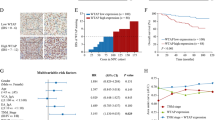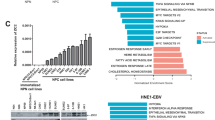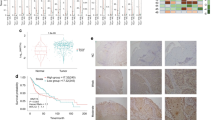Abstract
The development and progression of nasopharyngeal carcinoma (NPC) involves intricate interactions between tumor cells and other surrounding cells in the tumor microenvironment (TME). Tumor-associated macrophages (TAMs) play pivotal roles in the progression of NPC, but their interactions remain largely unexplored. In this study, we revealed that NPC promoted M2-like polarization of TAMs through enhanced synthesis and secretion of WNT2. These M2-type macrophages, in turn, significantly boosted the proliferation and metastasis of NPC. This vicious cycle perpetuated the malignant progression of NPC. Mechanistically, elevated m6A modification of WNT2 in NPC stabilized its mRNA and facilitated its protein expression, which is coordinately regulated by the m6A “eraser” ALKBH5 and the “reader” YTHDF1. NPC promoted M2-like polarization of macrophages by activating the FZD2/β-catenin signaling axis through paracrine WNT2. Furthermore, elevated WNT2 can also trigger the WNT/β-catenin signaling pathway in NPC cells through autocrine signaling, synergically contributing to NPC development. The research reveals that WNT2 is upregulated in an m6A modification-dependent manner and promotes M2-like macrophages polarization of TAMs and malignant progression of NPC. This discovery provides novel potential molecular markers and therapeutic targets for the diagnosis and treatment of NPC.
This is a preview of subscription content, access via your institution
Access options
Subscribe to this journal
Receive 50 print issues and online access
269,00 € per year
only 5,38 € per issue
Buy this article
- Purchase on SpringerLink
- Instant access to full article PDF
Prices may be subject to local taxes which are calculated during checkout







Similar content being viewed by others
Data availability
All data that support the findings of this study are available from the corresponding authors upon reasonable request.
References
Chen YP, Chan ATC, Le QT, Blanchard P, Sun Y, Ma J. Nasopharyngeal carcinoma. Lancet. 2019;394:64–80.
Sung H, Ferlay J, Siegel RL, Laversanne M, Soerjomataram I, Jemal A et al. Global Cancer Statistics 2020: GLOBOCAN estimates of incidence and mortality worldwide for 36 cancers in 185 countries. CA Cancer J Clin. 2021;71:209–49.
Tsao SW, Yip YL, Tsang CM, Pang PS, Lau VM, Zhang G et al. Etiological factors of nasopharyngeal carcinoma. Oral Oncol. 2014;50:330–8.
Bei JX, Li Y, Jia WH, Feng BJ, Zhou G, Chen LZ et al. A genome-wide association study of nasopharyngeal carcinoma identifies three new susceptibility loci. Nat Genet. 2010;42:599–603.
Xiong W, Zeng ZY, Xia JH, Xia K, Shen SR, Li XL et al. A susceptibility locus at chromosome 3p21 linked to familial nasopharyngeal carcinoma. Cancer Res. 2004;64:1972–4.
Chang ET, Liu Z, Hildesheim A, Liu Q, Cai Y, Zhang Z et al. Active and passive smoking and risk of nasopharyngeal carcinoma: a population-based case-control study in Southern China. Am J Epidemiol. 2017;185:1272–80.
Chen Y, Chang ET, Liu Q, Cai Y, Zhang Z, Chen G et al. Environmental factors for Epstein-Barr virus reactivation in a high-risk area of nasopharyngeal carcinoma: a population-based study. Open Forum Infect Dis. 2022;9:ofac128.
Chen YP, Zhao BC, Chen C, Lei XX, Shen LJ, Chen G et al. Alcohol drinking as an unfavorable prognostic factor for male patients with nasopharyngeal carcinoma. Sci Rep. 2016;6:19290.
Chen Y, Chang ET, Liu Q, Cai Y, Zhang Z, Chen G et al. Occupational exposures and risk of nasopharyngeal carcinoma in a high-risk area: a population-based case-control study. Cancer. 2021;127:2724–35.
Liu Z, Chang ET, Liu Q, Cai Y, Zhang Z, Chen G et al. Oral hygiene and risk of nasopharyngeal carcinoma-a population-based case-control study in China. Cancer Epidemiol Biomark Prev. 2016;25:1201–7.
Yang L, Liu G, Li Y, Pan Y. The emergence of tumor-infiltrating lymphocytes in nasopharyngeal carcinoma: Predictive value and immunotherapy implications. Genes Dis. 2022;9:1208–19.
Zhang YL, Li J, Mo HY, Qiu F, Zheng LM, Qian CN et al. Different subsets of tumor infiltrating lymphocytes correlate with NPC progression in different ways. Mol Cancer. 2010;9:4.
Wei C, Yang C, Wang S, Shi D, Zhang C, Lin X et al. Crosstalk between cancer cells and tumor associated macrophages is required for mesenchymal circulating tumor cell-mediated colorectal cancer metastasis. Mol Cancer. 2019;18:64.
Lu J, Li J, Lin Z, Li H, Lou L, Ding W et al. Reprogramming of TAMs via the STAT3/CD47-SIRPα axis promotes acquired resistance to EGFR-TKIs in lung cancer. Cancer Lett. 2023;564:216205.
Cassetta L, Pollard JW. Targeting macrophages: therapeutic approaches in cancer. Nat Rev Drug Discov. 2018;17:887–904.
Yang Y, Ye YC, Chen Y, Zhao JL, Gao CC, Han H et al. Crosstalk between hepatic tumor cells and macrophages via Wnt/β-catenin signaling promotes M2-like macrophage polarization and reinforces tumor malignant behaviors. Cell Death Dis. 2018;9:793.
Tian X, Wu Y, Yang Y, Wang J, Niu M, Gao S et al. Long noncoding RNA LINC00662 promotes M2 macrophage polarization and hepatocellular carcinoma progression via activating Wnt/β-catenin signaling. Mol Oncol. 2020;14:462–83.
Yang C, Dou R, Wei C, Liu K, Shi D, Zhang C et al. Tumor-derived exosomal microRNA-106b-5p activates EMT-cancer cell and M2-subtype TAM interaction to facilitate CRC metastasis. Mol Ther. 2021;29:2088–107.
Chen Y, Song Y, Du W, Gong L, Chang H, Zou Z. Tumor-associated macrophages: an accomplice in solid tumor progression. J Biomed Sci. 2019;26:78.
Qian BZ, Pollard JW. Macrophage diversity enhances tumor progression and metastasis. Cell. 2010;141:39–51.
Liao Q, Zeng Z, Guo X, Li X, Wei F, Zhang W et al. LPLUNC1 suppresses IL-6-induced nasopharyngeal carcinoma cell proliferation via inhibiting the Stat3 activation. Oncogene. 2014;33:2098–109.
Yap LF, Ahmad M, Zabidi MM, Chu TL, Chai SJ, Lee HM et al. Oncogenic effects of WNT5A in Epstein-Barr virus‑associated nasopharyngeal carcinoma. Int J Oncol. 2014;44:1774–80.
Lu Z, Zhou Y, Jing Q. Wnt5a-mediated autophagy promotes radiation resistance of nasopharyngeal carcinoma. J Cancer. 2022;13:2388–96.
Zhao BS, Roundtree IA, He C. Post-transcriptional gene regulation by mRNA modifications. Nat Rev Mol Cell Biol. 2017;18:31–42.
Zaccara S, Ries RJ, Jaffrey SR. Reading, writing and erasing mRNA methylation. Nat Rev Mol Cell Biol. 2019;20:608–24.
Deng LJ, Deng WQ, Fan SR, Chen MF, Qi M, Lyu WY et al. m6A modification: recent advances, anticancer targeted drug discovery and beyond. Mol Cancer. 2022;21:52.
Jing FY, Zhou LM, Ning YJ, Wang XJ, Zhu YM. The biological function, mechanism, and clinical significance of m6a rna modifications in head and neck carcinoma: a systematic review. Front Cell Dev Biol. 2021;9:683254.
Li ZX, Zheng ZQ, Yang PY, Lin L, Zhou GQ, Lv JW et al. WTAP-mediated m(6)A modification of lncRNA DIAPH1-AS1 enhances its stability to facilitate nasopharyngeal carcinoma growth and metastasis. Cell Death Differ. 2022;29:1137–51.
Zhao Y, Huang S, Tan X, Long L, He Q, Liang X et al. N(6) -methyladenosine-modified CBX1 regulates nasopharyngeal carcinoma progression through heterochromatin formation and STAT1 activation. Adv Sci. 2022;9:e2205091.
An Y, Duan H. The role of m6A RNA methylation in cancer metabolism. Mol Cancer. 2022;21:14.
Guan Q, Lin H, Miao L, Guo H, Chen Y, Zhuo Z et al. Functions, mechanisms, and therapeutic implications of METTL14 in human cancer. J Hematol Oncol. 2022;15:13.
Gong L, Luo J, Zhang Y, Yang Y, Li S, Fang X et al. Nasopharyngeal carcinoma cells promote regulatory T cell development and suppressive activity via CD70-CD27 interaction. Nat Commun. 2023;14:1912.
Wellenstein MD, Coffelt SB, Duits DEM, van Miltenburg MH, Slagter M, de Rink I et al. Loss of p53 triggers WNT-dependent systemic inflammation to drive breast cancer metastasis. Nature. 2019;572:538–42.
Pukrop T, Klemm F, Hagemann T, Gradl D, Schulz M, Siemes S et al. Wnt 5a signaling is critical for macrophage-induced invasion of breast cancer cell lines. Proc Natl Acad Sci USA. 2006;103:5454–9.
Ma Z, Li X, Mao Y, Wei C, Huang Z, Li G et al. Interferon-dependent SLC14A1(+) cancer-associated fibroblasts promote cancer stemness via WNT5A in bladder cancer. Cancer Cell. 2022;40:1550–1565.e7.
Gong L, Kwong DL, Dai W, Wu P, Li S, Yan Q et al. Comprehensive single-cell sequencing reveals the stromal dynamics and tumor-specific characteristics in the microenvironment of nasopharyngeal carcinoma. Nat Commun. 2021;12:1540.
Zhu HH, Zhu XY, Zhou MH, Cheng GY, Lou WH. Effect of WNT5A on epithelial-mesenchymal transition and its correlation with tumor invasion and metastasis in nasopharyngeal carcinoma. Asian Pac J Trop Med. 2014;7:488–91.
Gao J, Liang Y, Wang L. Shaping polarization of tumor-associated macrophages in cancer immunotherapy. Front Immunol. 2022;13:888713.
Meng Z, Zhang R, Wang Y, Zhu G, Jin T, Li C et al. miR-200c/PAI-2 promotes the progression of triple negative breast cancer via M1/M2 polarization induction of macrophage. Int Immunopharmacol. 2020;81:106028.
Zarif JC, Baena-Del Valle JA, Hicks JL, Heaphy CM, Vidal I, Luo J et al. Mannose receptor-positive macrophage infiltration correlates with prostate cancer onset and metastatic castration-resistant disease. Eur Urol Oncol. 2019;2:429–36.
Xu Y, Liao C, Liu R, Liu J, Chen Z, Zhao H et al. IRGM promotes glioma M2 macrophage polarization through p62/TRAF6/NF-κB pathway mediated IL-8 production. Cell Biol Int. 2019;43:125–35.
Hu H, Tu W, Chen Y, Zhu M, Jin H, Huang T et al. The combination of PKM2 overexpression and M2 macrophages infiltration confers a poor prognosis for PDAC patients. J Cancer. 2020;11:2022–31.
Fu Y, Zheng Q, Mao Y, Jiang X, Chen X, Liu P et al. WNT2-mediated FZD2 stabilization regulates esophageal cancer metastasis via STAT3 signaling. Front Oncol. 2020;10:1168.
Wang HX, Tekpetey FR, Kidder GM. Identification of WNT/beta-CATENIN signaling pathway components in human cumulus cells. Mol Hum Reprod. 2009;15:11–7.
Klein D, Demory A, Peyre F, Kroll J, Augustin HG, Helfrich W et al. Wnt2 acts as a cell type-specific, autocrine growth factor in rat hepatic sinusoidal endothelial cells cross-stimulating the VEGF pathway. Hepatology. 2008;47:1018–31.
Yin C, Ye Z, Wu J, Huang C, Pan L, Ding H et al. Elevated Wnt2 and Wnt4 activate NF-κB signaling to promote cardiac fibrosis by cooperation of Fzd4/2 and LRP6 following myocardial infarction. EBioMedicine. 2021;74:103745.
Kaffe E, Roulis M, Zhao J, Qu R, Sefik E, Mirza H et al. Humanized mouse liver reveals endothelial control of essential hepatic metabolic functions. Cell. 2023;186:3793–3809.e26.
Mazzotta S, Neves C, Bonner RJ, Bernardo AS, Docherty K, Hoppler S. Distinctive roles of canonical and noncanonical Wnt Signaling in Human Embryonic Cardiomyocyte Development. Stem Cell Rep. 2016;7:764–76.
Tan XY, Li YT, Li HH, Ma LX, Zeng CM, Zhang TT et al. WNT2-SOX4 positive feedback loop promotes chemoresistance and tumorigenesis by inducing stem-cell like properties in gastric cancer. Oncogene. 2023;42:3062–74.
Hsu TN, Huang CM, Huang CS, Huang MS, Yeh CT, Chao TY et al. Targeting FAT1 inhibits carcinogenesis, induces oxidative stress and enhances cisplatin sensitivity through deregulation of LRP5/WNT2/GSS signaling axis in oral squamous cell carcinoma. Cancers. 2019;11:1883.
Feng Y, Ren J, Gui Y, Wei W, Shu B, Lu Q et al. Wnt/β-catenin-promoted macrophage alternative activation contributes to kidney fibrosis. J Am Soc Nephrol. 2018;29:182–93.
Zhao SJ, Kong FQ, Jie J, Li Q, Liu H, Xu AD et al. Macrophage MSR1 promotes BMSC osteogenic differentiation and M2-like polarization by activating PI3K/AKT/GSK3β/β-catenin pathway. Theranostics. 2020;10:17–35.
Henderson WR Jr, Chi EY, Ye X, Nguyen C, Tien YT, Zhou B et al. Inhibition of Wnt/beta-catenin/CREB binding protein (CBP) signaling reverses pulmonary fibrosis. Proc Natl Acad Sci USA. 2010;107:14309–14.
Ackers I, Malgor R. Interrelationship of canonical and non-canonical Wnt signalling pathways in chronic metabolic diseases. Diab Vasc Dis Res. 2018;15:3–13.
Gajos-Michniewicz A, Czyz M. WNT signaling in melanoma. Int J Mol Sci. 2020;21:4852.
Wang YM, Peng ZY, Zhang LY, Wang YX, Fan RH, Zhang H et al. N6-Methyladenosine RNA modification landscape in the occurrence and recurrence of nasopharyngeal carcinoma. World J Oncol. 2022;13:205–15.
Wang X, Lu Z, Gomez A, Hon GC, Yue Y, Han D et al. N6-methyladenosine-dependent regulation of messenger RNA stability. Nature. 2014;505:117–20.
Yang S, Liu Y, Li MY, Ng CSH, Yang SL, Wang S et al. FOXP3 promotes tumor growth and metastasis by activating Wnt/β-catenin signaling pathway and EMT in non-small cell lung cancer. Mol Cancer. 2017;16:124.
Ruiz de Galarreta M, Bresnahan E, Molina-Sánchez P, Lindblad KE, Maier B, Sia D et al. β-Catenin activation promotes immune escape and resistance to anti-PD-1 therapy in hepatocellular carcinoma. Cancer Discov. 2019;9:1124–41.
Zhang G, Gao Z, Guo X, Ma R, Wang X, Zhou P et al. CAP2 promotes gastric cancer metastasis by mediating the interaction between tumor cells and tumor-associated macrophages. J Clin Invest. 2023;133:e166224.
Yao Y, Chen C, Wang J, Xuan H, Chen X, Li Z et al. Circular RNA circATP9A promotes non-small cell lung cancer progression by interacting with HuR and by promoting extracellular vesicles-mediated macrophage M2 polarization. J Exp Clin Cancer Res. 2023;42:330.
Yu Y, Ke L, Lv X, Ling YH, Lu J, Liang H et al. The prognostic significance of carcinoma-associated fibroblasts and tumor-associated macrophages in nasopharyngeal carcinoma. Cancer Manag Res. 2018;10:1935–46.
Zhang B, Miao T, Shen X, Bao L, Zhang C, Yan C et al. EB virus-induced ATR activation accelerates nasopharyngeal carcinoma growth via M2-type macrophages polarization. Cell Death Dis. 2020;11:742.
Fang Y, Shen ZY, Zhan YZ, Feng XC, Chen KL, Li YS et al. CD36 inhibits β-catenin/c-myc-mediated glycolysis through ubiquitination of GPC4 to repress colorectal tumorigenesis. Nat Commun. 2019;10:3981.
Fu L, Zhang C, Zhang LY, Dong SS, Lu LH, Chen J et al. Wnt2 secreted by tumour fibroblasts promotes tumour progression in oesophageal cancer by activation of the Wnt/β-catenin signalling pathway. Gut. 2011;60:1635–43.
Huang TX, Tan XY, Huang HS, Li YT, Liu BL, Liu KS et al. Targeting cancer-associated fibroblast-secreted WNT2 restores dendritic cell-mediated antitumour immunity. Gut. 2022;71:333–44.
Wang Z, Li B, Li S, Lin W, Wang Z, Wang S et al. Metabolic control of CD47 expression through LAT2-mediated amino acid uptake promotes tumor immune evasion. Nat Commun. 2022;13:6308.
Zhang H, Li R, Cao Y, Gu Y, Lin C, Liu X et al. Poor clinical outcomes and immunoevasive contexture in intratumoral IL-10-producing macrophages enriched gastric cancer patients. Ann Surg. 2022;275:e626–e635.
Tang Q, Li L, Wang Y, Wu P, Hou X, Ouyang J et al. RNA modifications in cancer. Br J Cancer. 2023;129:204–21.
Yang Y, Hsu PJ, Chen YS, Yang YG. Dynamic transcriptomic m(6)A decoration: writers, erasers, readers and functions in RNA metabolism. Cell Res. 2018;28:616–24.
Tan F, Zhao M, Xiong F, Wang Y, Zhang S, Gong Z et al. N6-methyladenosine-dependent signalling in cancer progression and insights into cancer therapies. J Exp Clin Cancer Res. 2021;40:146.
Wang T, Kong S, Tao M, Ju S. The potential role of RNA N6-methyladenosine in cancer progression. Mol Cancer. 2020;19:88.
Huang H, Weng H, Chen J. m(6)A modification in coding and non-coding RNAs: roles and therapeutic implications in cancer. Cancer Cell. 2020;37:270–88.
Acknowledgements
The authors acknowledge the BioRender (www.biorender.com), as Fig. S2C, 3A and 7E in this article was created with BioRender platform. This study was funded by the National Natural Science Foundation of China (U21A20382), the Natural Science Foundation of Hunan Province (2024JJ3035), and the Natural Science Foundation of Changsha (kh2301025), and the Fundamental Research Funds for the Central Universities of Central South University (2024ZZTS0529).
Author information
Authors and Affiliations
Contributions
QLT designed the project and completed most experiments., LYL, JSG, DW, HKQ performed some of the experiments. JW, QW, ZYP, YZM collected tissue samples. QLT analyzed the data and wrote the manuscript. YMW, CMF, QJY, PC, HH, WJG, LS, ZYZ, and WX revised the manuscript. LS, PC, and WX are responsible for research supervision and funding acquisition. All authors read and approved the final manuscript.
Corresponding authors
Ethics declarations
Competing interests
The authors declare no competing interests.
Ethics approval
All animal studies were approved by the Laboratory Animal Ethics Committee of Central South University (Approval No: CSU-2022-0569). All animal experiments strictly adhered to the ethical guidelines and regulations of the committee.
Additional information
Publisher’s note Springer Nature remains neutral with regard to jurisdictional claims in published maps and institutional affiliations.
Supplementary information
Rights and permissions
Springer Nature or its licensor (e.g. a society or other partner) holds exclusive rights to this article under a publishing agreement with the author(s) or other rightsholder(s); author self-archiving of the accepted manuscript version of this article is solely governed by the terms of such publishing agreement and applicable law.
About this article
Cite this article
Tang, Q., Li, L., Ge, J. et al. m6A modification-dependent upregulation of WNT2 facilitates M2-like macrophage polarization and perpetuates malignant progression of nasopharyngeal carcinoma. Oncogene (2025). https://doi.org/10.1038/s41388-025-03452-7
Received:
Revised:
Accepted:
Published:
DOI: https://doi.org/10.1038/s41388-025-03452-7



